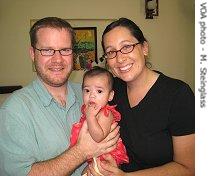2007年VOA标准英语-Adoption of Vietnamese Babies on the Rise(在线收听)
Hanoi
30 August 2007
In March, when Angelina Jolie and Brad Pitt adopted a Vietnamese child, they created one of the biggest media circuses the country had ever seen. But while they were surely the most famous foreigners to adopt in Vietnam, they were hardly the only ones. With adoption is growing more difficult in China and elsewhere, many American and European adoptive parents are turning to Vietnam. In Hanoi, Matt Steinglass has more.
 |
| Jeff and Cerise Roth-Vinson hold Oriana, the 6-month-old girl they recently adopted in Vietnam |
"We've been married for almost 13 years now, and we always knew that if we decided to have children, we would want to adopt," explained Cerise.
The Roth-Vinsons were volunteers together in the U.S. Peace Corps. They live in the U.S. state of Oregon, where Jeff is a high school science teacher, and Cerise works for an international educational exchange organization.
The newest addition to their family is a little Vietnamese girl named Oriana.
"She's six months. And just over five months when we got her. So we've had almost a month together," said Cerise.
Jeff and Cerise are part of a growing wave of American parents adopting in Vietnam. Americans adopted 312 Vietnamese babies in the last six months of 2006.
In the first half of 2007, that rose to 418. U.S. Embassy officials predict it will grow to 1,000 by year's end.
Dr. Jane Aronson, an adoption counselor in New York City, says there are a number of reasons for the rising numbers.
"The appeal for Vietnam, at this point, and it's always been the same, is that the process is very pleasant," Dr. Aronson said. "The process is usually between nine and 12 months, and the babies are well cared for, in small baby homes, and it's a kind of lovely experience for people. The flexibility of the system to allow single-parent adoptions is very nice as well."
Single parents used to look to China to adopt. But China has instituted new regulations that bar foreign single parents from adopting, as well as obese people and couples with more than two divorces between them.
Chinese babies still make up the largest number of children adopted by foreigners, but the numbers have been falling. In 2005, Americans adopted nearly 8,000 Chinese children. In 2006, that fell to 6,500, and the waiting time to get a child stands at one and a half years.
Other Asian countries, such as South Korea, have made foreign adoption more difficult as well. In Cambodia, foreign adoptions have ceased entirely because too many adoption brokers were found to be trafficking - paying parents for their babies.
Vietnam, too, had problems with trafficking for adoption in the late 1990s. The director of Vietnam's Department of Inter-Country Adoptions, Vu Duc Long, says in 2003, the country blocked all adoptions to the U.S. and several other countries while it reformed its procedures.
Long says in the 1990s and early in this decade, there were scores of cases of adoption brokering for profit, and dozens of officials were sent to prison.
In 2005, the country introduced a new adoption system and signed a new agreement on adoptions with the United States.
The U.S. has a complicated history regarding adoptions from Vietnam. In 1975, in the waning days of the Vietnam War, American philanthropies organized Operation Babylift, which flew thousands of children to the U.S. for adoption, to escape what Americans perceived as the Communist threat.
Hundreds of those children died when one of the transport planes crashed on takeoff.
Such historical echoes were not an issue for the Roth-Vinsons. Jeff says they chose Vietnam because it is a country they could feel a connection to.
"It was very easy for us to pick Vietnam. A wonderful country, with a rich culture and history, and something that fits very well with us, since her culture, her home culture, will be a part of our life, too, for her entire lifetime, and our lifetimes, too," said Jeff.
For Oriana Roth-Vinson, the historical issues did not seem very important, either.